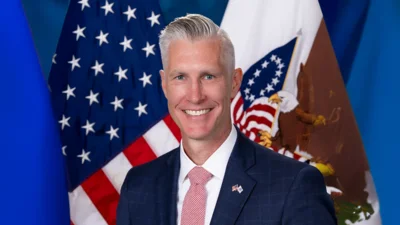Daniel P. Mehan, President and CEO | Missouri Chamber of Commerce and Industry
Daniel P. Mehan, President and CEO | Missouri Chamber of Commerce and Industry
The rapid expansion of generative artificial intelligence (AI) tools such as ChatGPT has significantly changed the landscape for businesses and workers in Missouri since late 2022. AI adoption is outpacing previous technologies, with ChatGPT reporting 500 million weekly users and over 2.5 billion daily queries.
According to U.S. Census Bureau data, the proportion of Missouri businesses using AI has more than tripled since September 2023. By mid-July 2025, 10.5% of Missouri businesses reported AI usage, surpassing the national average of 9.3%. When asked about future plans, 14.4% of Missouri firms indicated they would use AI in the next six months compared to 12.3% nationwide.
While widespread changes in hiring or major industry disruptions due to AI have yet to materialize in Missouri, there is consensus that AI tools are starting to alter job requirements and will likely affect certain industries more than others within three to five years.
At the federal level, the United States remains a leader in global AI development. Advocates argue that avoiding a patchwork of state regulations is crucial for maintaining this position. An attempt to halt state-by-state regulation was removed from recent federal legislation before it became law.
On July 23, 2025, the White House released “America’s AI Action Plan,” which it called a “national security imperative” for U.S. technological dominance in AI. The report recommends accelerating innovation—including discouraging states from imposing burdensome regulations—building infrastructure like data centers and modern energy grids, and leading international efforts on diplomacy and security involving AI.
States have responded differently to the challenges and opportunities presented by AI. Some focus on using AI for government efficiency; others emphasize limiting risks associated with data use or machine-based decisions; workforce training is also a priority for several states; while some seek business growth through technology investment.
Efforts to regulate AI at the state level have resulted in more than 1,000 bills introduced across all states during the past year, but only a few comprehensive laws have been enacted so far. Colorado stands out as having passed broad legislation covering multiple sectors, whereas other states either failed to pass such bills or scaled them back due to concerns about stifling innovation or administrative complexity.
Instead of sweeping reforms, many states are enacting targeted measures addressing issues like digital likeness protection and deepfake prevention, clarifying content ownership generated by AI tools, or requiring transparency when interacting with non-human agents—as seen in New York’s new law on companion software monitoring user well-being and disclosure requirements.
Workforce training initiatives vary widely across regions within most states due to differences in local needs and available resources. States like Virginia are commissioning studies to better forecast demand for training by occupation and region. Michigan has launched an “AI and the Workforce Plan” focused on upskilling existing employees rather than only preparing new entrants or displaced workers.
Traditional degree programs may not meet emerging skill needs fast enough; instead, professional associations are incorporating AI literacy into continuing education offerings for fields such as law or accounting.
For economic development, states with established technology sectors see opportunities for growth through investment in infrastructure—like affordable power supplies and robust data transmission networks—and workforce preparation programs tailored toward tech roles. Some legislatures have created task forces aimed at identifying business opportunities related to AI deployment—for example, West Virginia’s recent statewide initiative charged with promoting economic prospects linked to artificial intelligence.
Missouri's longstanding commitment over the past decade toward growing its technology sector positions it well for proactive engagement with ongoing developments in artificial intelligence policy and practice. The combination of worker training programs, measured legislative approaches tailored toward specific needs rather than blanket regulations, and continued investment in technological infrastructure may enable Missouri’s businesses and citizens to benefit substantially from advances in this transformative field over coming years.






 Alerts Sign-up
Alerts Sign-up